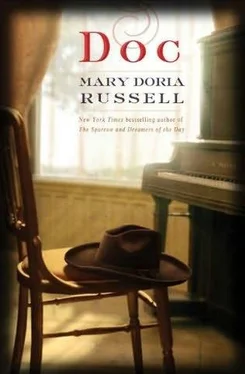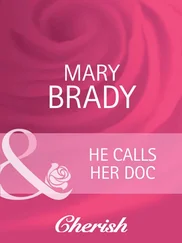In early August, Alexander arrived at yet another indistinguishably squalid village and was taken immediately to an Indian girl of fifteen. She requested baptism from Alexander himself, rather than waiting for Father Paul, for she knew she was near death from consumption and wished to join the Church. Though her relatives were heathens, they could not deny this beloved child anything that might ease her passing. Alexander had just enough time for a brief preparation before the girl’s wish could be fulfilled. Then he laid the consecrated Host on the tongue of the newly christened Mary Clare.
With that food of angels in her mouth, she breathed out her soul and was immediately united with her Creator. There was a hushed, awestruck moment before her family began to wail. She is in heaven, Alexander thought, stunned. I have witnessed a saint’s death.
In the long years to come, Alexander von Angensperg would pray for Mary Clare’s intercession, especially after he was transferred to the Rosebud Reservation in the 1890s. Nine of ten Lakota died of tuberculosis in those days, and each time Alexander was called to a deathbed like Mary Clare’s, he prayed that she would bring about one of the three miracles he needed to present her case for canonization.
By the time Alexander had assembled his evidence, the Sacra Rituum Congregatio had already begun beatification of a young Carmelite nun known to her devotees as the Little Flower of Jesus. Like Mary Clare, Thérèse of Lisieux had suffered from and died of tuberculosis, but the Little Flower had influential European supporters who were able to press her cause in Rome; Mary Clare had a single elderly Jesuit in South Dakota, so the petition on her behalf languished in back offices of the Vatican. But Alexander von Angensperg knew what he knew. That beautiful Indian child was in heaven. She was especially solicitous of those dying of consumption. And she could effect a cure—or at least a remission—of the disease in special circumstances.
He had seen this thrice, he believed, with his own eyes. The first time was in the summer of 1878, just outside Dodge City.
* * *
That August, after the crops were in and before the harvest began, a two-week platform convention for the Republican Party of Kansas was held in Topeka. Among the delegates was Wyatt S. Earp (occupation: policeman; residence: Dodge City, Ford County). Neatly dressed in black and wearing a decent pair of freshly polished boots, Deputy Earp was accompanied by a quiet woman whose age was difficult to guess. She was not young, but neither was she more worn than might be expected of a farmer’s wife, and she was well turned out in a deep blue that complemented her hair and complexion. Wyatt would introduce her as Mattie Earp but did not call her “my wife,” for they were not married then and never would be. He let her use his name for the occasion and did not tell her to quit it afterward.
The morning Mattie and Wyatt left for Topeka, Morgan and Lou and Doc and Kate came to the Dodge depot to see them off. Morgan had been on Wyatt’s back all week about letting Doc exercise Dick Naylor while Wyatt was away. Wyatt still hadn’t said yes or no. He didn’t want any trouble with Kate—there’d be hell to pay if anything happened—but he hated to disappoint Doc.
Morgan was giving it one last try as the warning whistle shrieked. “Come on, Wyatt! Doc knows to be careful, and I’ll watch out for him.”
Kate didn’t say anything, but she was standing right behind Doc, where Wyatt could see her scowl and Doc couldn’t.
“I don’t know,” Wyatt said, glancing at Kate. “What if Dick gets spooked by a coyote or something? He might throw you again, Doc. And you’d be out on the prairie—”
“I won’t go far,” Doc promised. “And I’ll stick to trails with traffic on them. And I’ll tell Morg when I’m leavin’. If I don’t get back in a couple of hours, he can come lookin’ for me. Did you read that Scientific American article I gave you?”
Doc doesn’t know! Mattie realized with some surprise. Wyatt hasn’t told him!
Which meant Wyatt was embarrassed that he couldn’t hardly read. And that was the first sign she’d had that Mr. Wyatt Earp wasn’t quite so perfect as he seemed. It made Mattie feel a little better about him.
She had listened while Morgan read the article to Wyatt. There was a new notion about how to cure consumption: a combination of hard exercise and cold baths was supposed to “build resistance to the illness” and give people like Doc the strength to get over it. Doc’s idea was that he could take Dick Naylor out for an hour or two of riding every day while Wyatt was out of town. The horse would stay in condition for a race that was coming up at the end of the month, and Doc would have a couple of weeks to find out if he got any better. “We’ll see if that punishment fits my crime” was how he put it. If the exercise didn’t help or if he felt worse, he’d give it up and let Morgan take over Dick’s care until Wyatt got back.
Mattie knew her place. She had no right to mix in, but Doc had been helpful to her and she wanted to take his side. The only reason she was going to Topeka was because Doc showed her how to pick out dresses and told her about table manners and things like that. Otherwise she’d have found an excuse, even though Wyatt thought she’d enjoy the excursion and claimed he really wanted her to come with him.
Mattie rarely said a word in public, and not much more in private. It took her until the train was almost ready to go before she found the nerve to touch Wyatt’s elbow. “He’ll break down or he’ll toughen up,” she said. “Let him find out which.”
Everybody looked at her like she was a pig that up and flew.
Wyatt blinked a couple of times and finally said, “Oh, hell. All right, then,” probably because Mattie had never asked for anything before and he didn’t want to say no to her the first time. Morg grinned that big happy smile of his. Kate narrowed her eyes and glared. Doc told Wyatt he wouldn’t regret it, then took Mattie’s hand and kissed it like she was a lady, and leaned over to whisper, “Mattie, honey, I am in your debt.”
The conductor was hollering, “Board!” by then. Wyatt tried to help Mattie up the long first step, but she told him, “I ain’t crippled.” She meant that she wasn’t some fragile little thing that needed to be treated like a china doll, but Wyatt looked kind of hurt, so she shrugged and let him take her arm, if that’s what he wanted.
Inside the car, Wyatt was going to have her sit on the aisle so she wouldn’t get dirty from the ash or get holes in her clothes from the cinders. Feeling bolder, she told him, “I’d like to see,” so he let her be by the window instead.
Doc was still standing on the platform when the train pulled away. Mattie gave him a little wave. He swept off his slouch hat, held it over his heart, and bowed, his shining eyes on Mattie’s own.
It would have annoyed her if Wyatt did that, but somehow … Doc was different.
His first foray on Dick was enjoyable and uneventful. True to his word, he didn’t ride far, turning back after half an hour, while he still had enough starch left to unsaddle the horse himself and brush the animal down.
The second day was harder, for he had stiffened some. The third, it was a real struggle to tack up. As he approached the Elephant Barn on the way back, he was sufficiently whipped to consider paying the oldest of the Riney boys to take care of the horse. Instead, he rested for a few minutes after dismounting. Then he managed on his own.
Things got better after that.
With some experimentation, he determined that the best time to ride was just past sunup, before the summer heat set in. By the end of the first week, he found it noticeably easier to lift the saddle from the rack, carry it to Dick Naylor’s side, and settle it onto the horse’s back. Even Kate had to admit that riding was good for him. He was stronger, no doubt about it. And he was hungry again—genuinely by-God hungry . For food. For music. For Kate.
Читать дальше












